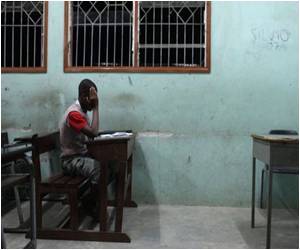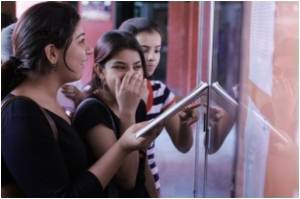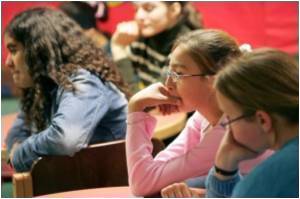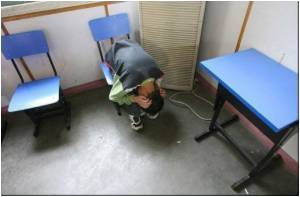Crowded Mozambique classrooms have led to a rise in night school students.

"Perhaps when you leave, the teacher comes, then you miss the lesson," she tells AFP.
Her challenges are routine for students in one of the world's poorest countries, which is struggling to educate not only its youth, but also adults who missed out on schooling during decades of war.
Classes have an average of 66 students per teacher, and schools run in three shifts from 7:00 am to 10:00 pm to cope with the numbers.
After starting a family, Joana returned to school with classmates half her age to better her chances of finding a good job. Even basic education would set her apart in the southern African country where adults have on average 1.2 years of schooling, according to the United Nations.
Eventually, the grade nine pupil takes the dirt road home from the Escola Primaria do Triunfo in Maputo. It is hard not knowing if the teacher will come or not, she says.
Advertisements
The mathematics class has already been cancelled because no teacher is available, so school closes earlier than the usual 10:00 pm.
Advertisements
Night school began under the Portuguese colonisers, but Mozambique kept the system after independence in 1975 to cope with the student overflow.
This means that Aida Bila, 16, sometimes has to walk the five kilometres (three miles) home in the dark if public transport has stopped or her family cannot afford the fare.
Though the aspiring lawyer is worried about the missed lessons, the teachers help them during exams, she says.
"They don?t always give answers, but sometimes they do."
Even when teachers are present, many students come to school only to socialise, says educator Carlos Francisco.
"The system created the conditions for them to lose interest," he says. "In the lower classes they are passed automatically, then they come here and can't read or write."
Francisco teaches design, but without any instruments to instruct his classes. The 29-year-old father works 14 hours a day at three schools to support his family, but some educators have even worse schedules, he says.
"The government is trying to improve, only the country has so many challenges. Let's face it, it's poor."
Mozambique has budgeted 22.8 billion meticals ($730 million, 493 million euros) for education this year, around 18 percent of the national budget.
International donors are contributing at least $85 million (57 million euros) of the education budget, but had to cut donations because of the global economic downturn.
Authorities further cut parts of the budget to channel money to subsidies after 14 died in food riots in September, although education as a whole received more money this year.
"This affected the functioning of the ministry a lot," according to education ministry planning director Manuel Rego.
"With the riots last year, there wasn't time to do a good work" with the budget, he said.
Authorities are building more schools and training teachers despite the setbacks, Rego adds.
"Although it's hard to see, conditions improved a lot."
One encouraging point is the enrolment of girls, with almost one girl per boy in primary schools.
All the same, education will not improve for the country's 6.9 million pupils soon, with a 2015 Millennium Development Goal target of 55 pupils per teacher unlikely, Rego acknowledges.
"We won?t be able to expand the network of schools in the next years."
Source-AFP









